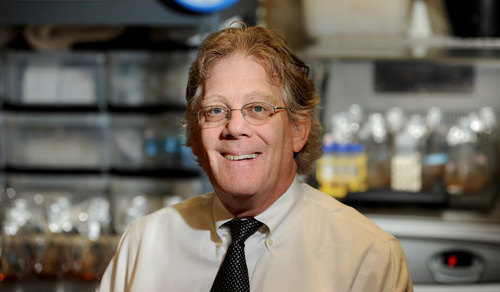Master Clinician: Henry Chambers, III, MD
Matching Wits with Infectious Disease
 "I'm constantly surprised by diseases that I'm supposedly an expert in," says Henry "Chip" Chambers, MD, chief of the Division of Infectious Diseases at San Francisco General Hospital (SFGH). "They keep finding new ways to trick me."
"I'm constantly surprised by diseases that I'm supposedly an expert in," says Henry "Chip" Chambers, MD, chief of the Division of Infectious Diseases at San Francisco General Hospital (SFGH). "They keep finding new ways to trick me."
Recently, he saw a patient with an overwhelming staphylococcal infection that was unresponsive to treatment. A few weeks earlier, she had presented with what appeared to be ovarian cancer, a seemingly unrelated diagnosis. However, as it turned out, the patient did not have cancer after all; the ovaries proved to be the source of infection – a very rare manifestation for which he only found one citation in the medical literature.
"People who are good clinicians are methodical," says Chambers. "There are a couple approaches: you can generate an exhaustive list and hack through it to get to the right answer. I favor the approach of discarding the stuff that's probably a sideshow, but you always have to go back and double-check if you haven't figured it out with your first list. In this case, the sideshow turned out to be the main show."
His colleagues prize his expertise. "Dr. Chambers is the consummate consultant and teacher," says Margaret Wheeler, MD, a colleague at SFGH. "When wrestling with a complex case, 'Let's ask Chip,' is a common refrain. He distills complex information into a form that is accessible and relevant."
Chambers was an infectious diseases fellow at SFGH in 1981 when AIDS made its first appearance. "I was watching something that was a big-time, major world development in my subspecialty," he says. "It was like discovering coronary artery disease – it was intellectually exciting. On the other hand, we were taking care of people who had a death sentence, and were our age or younger. We had to be very frank about the limits of our knowledge and skill. And while I'm not at all religious, I quickly learned that I shouldn't preach atheism to somebody for whom God was important."
Compared to the dismal prognosis for HIV/AIDS at that time, studying the Staphylococcus aureus bacteria felt more manageable. That year he conducted his first experiment on methicillin-resistant Staphylococcus aureus (MRSA), which is now one of his main areas of research. To help reduce the development of resistance to a dwindling number of drugs available to treat infection, Chambers is currently trying to define which staph infections actually require treatment with antibiotics. For example, simple abscesses often can be surgically drained and do not need further treatment. He is also researching ways to improve outcomes for patients with the most serious staph infections.
Chambers is married to Joyce Hansen, MD, an internist at California Pacific Medical Center. They have two grown children, and enjoy tending their vineyard in Sonoma.